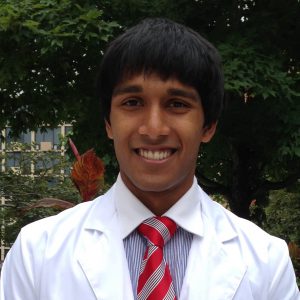
Sudan Loganathan
Graduate Student, Neuroscience
Mentors:
Dr. Jialiang Wang (Thesis)
Dr. Scott Borinstein (Clinical)
I am currently completing my third year as a PhD Candidate in Neuroscience and Cancer Pharmacology in the laboratory of Dr. Jialiang Wang. Dr. Wang’s research interests are to understand the epigenetic mechanisms of cancer. My thesis research under the guidance of Dr. Wang is to determine if there is an epigenetic origin to a highly prevalent aberrantly activated transcription factor in Ewing’s sarcoma. More specifically, I have sought out to determine if the epigenetic reader, BET Bromodomain Proteins, regulates the oncogenic transcription factor EWS-FLI1 which is the exclusive driver of Ewing’s sarcoma. Past studies have not been able to determine a means to effectively target EWS-FLI1 activity in Ewing patients; hence the current method of treatment is surgery and chemotherapy combination regimen that can prove to be ineffective in a vast majority of cases. My studies will provide novel insight on the epigenetics of Ewing’s sarcoma development, and the link between epigenetics and the driving transcription factor of the cancer. Additionally, by utilizing newly developed BET protein inhibitors, determine if a target therapy to specifically abolish activity of EWS-FLI1 can be achieved. This study can have a major impact on the current treatment regimen for Ewing patients.
My clinical mentor is Dr. Scott C. Borinstein, Director of the Pediatric Sarcoma Division at Monroe Carell Jr. Children’s Hospital at Vanderbilt. Dr. Borinstein has expertise in Ewing’s sarcoma and has extensively studied this cancer type during his medical training and practice at Vanderbilt. Dr. Borinstein has provided knowledgeable insight regarding the nuances of Ewing’s sarcoma research and updates on advancements being made in the field. Additionally, as my clinical mentor, he has invited me to partake in Tumor Board Meetings and Pediatric Hematology/Oncology Grand Rounds which has provided great insight into the clinical approach of treating these cancer types. Moreover, I am able to understand my role as a translational researcher and what areas are in need for me to address using my knowledge in the basic sciences. This exposure has also brought Dr. Borinstein in has a collaborator of our laboratory which will further benefit my thesis research if we are to expand into patient-derived tumor specimens and clinical trial initiation to further validate the clinical relevance of my study.